Trial Attorney Resume Examples

Jul 18, 2024
|
12 min read
Crafting an effective trial attorney resume: put your best case forward with these tips on showcasing your legal skills, courtroom experience, and dedication to justice. Make your resume stand out in the legal field.
Rated by 348 people
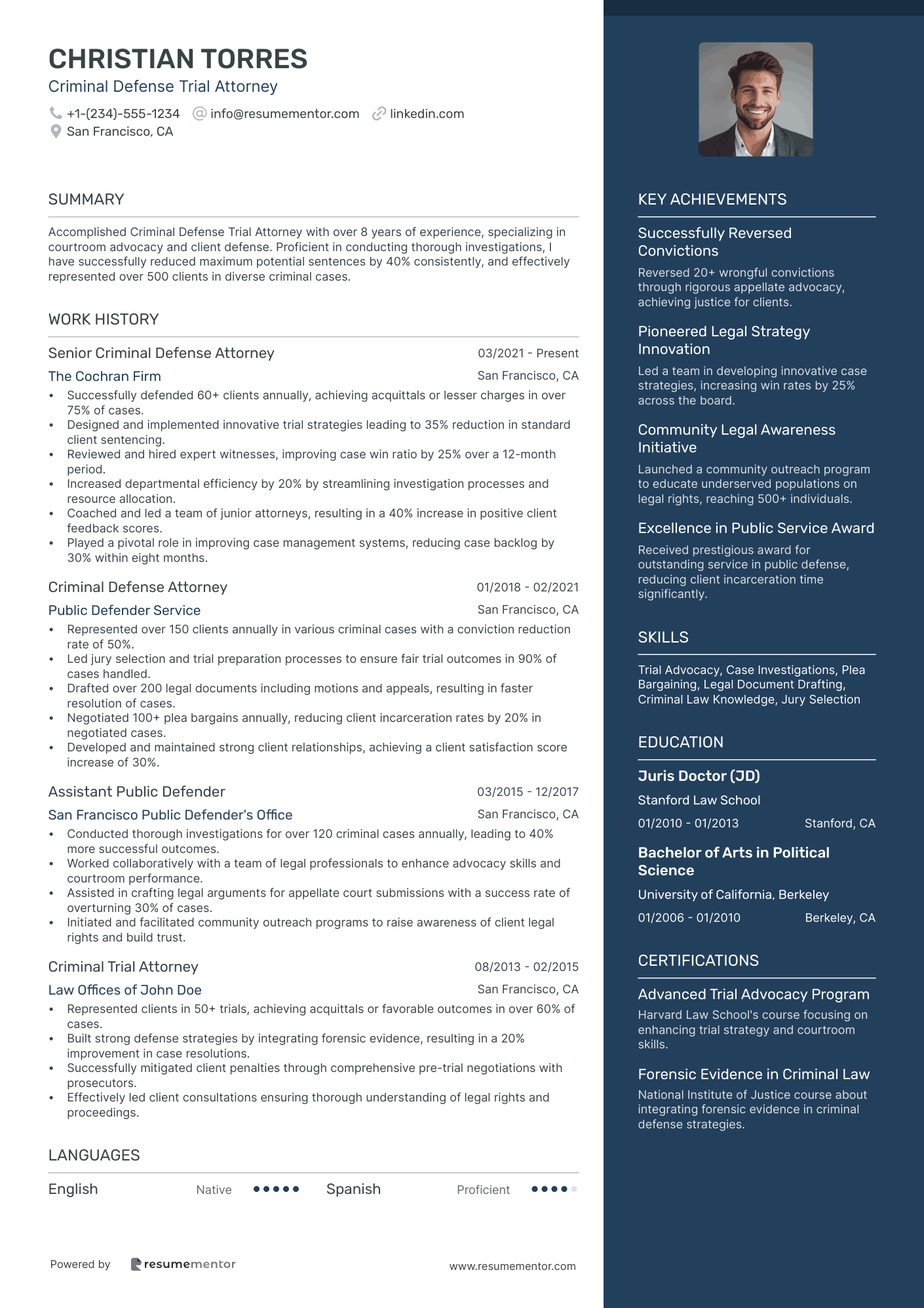
Criminal Defense Trial Attorney
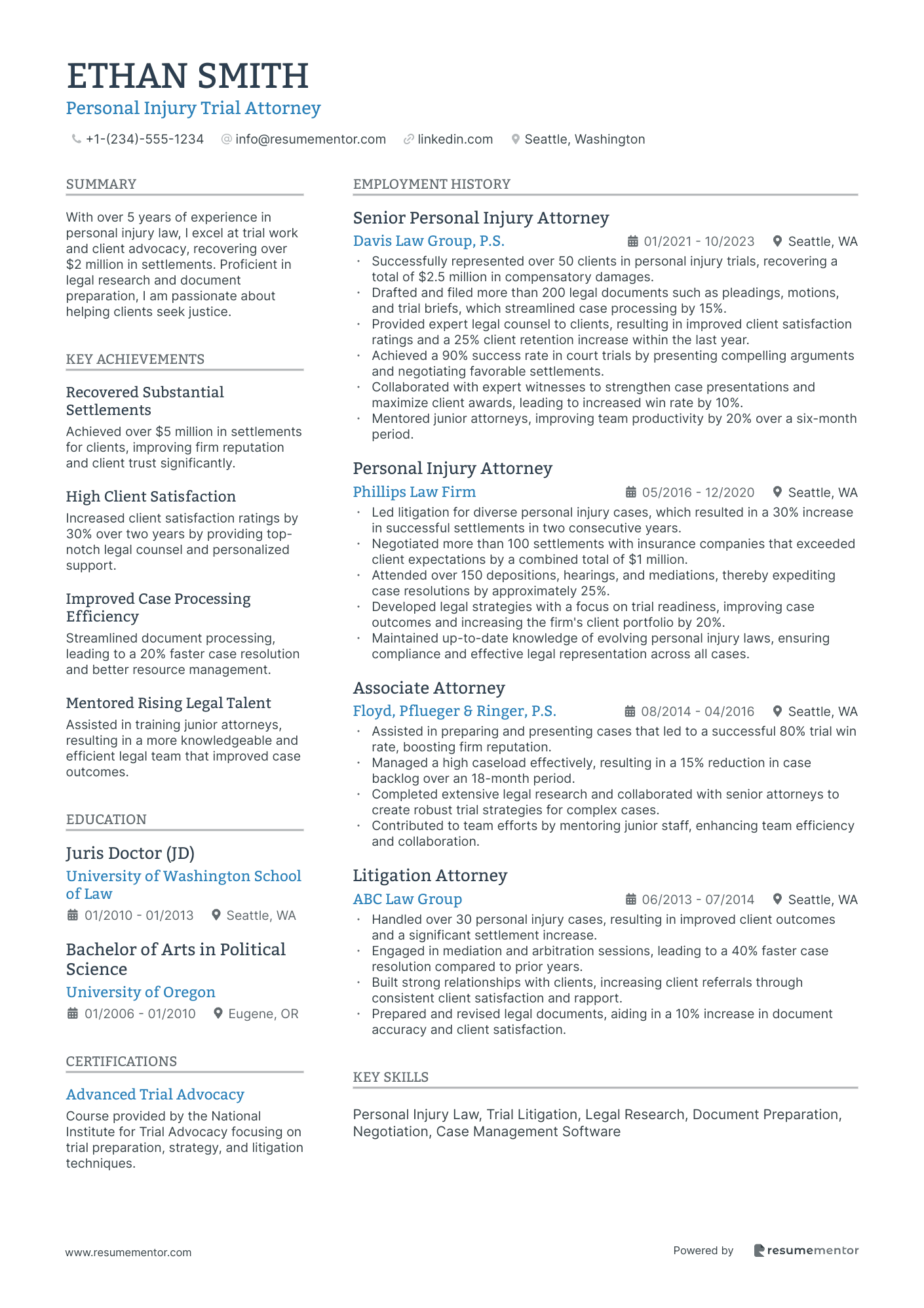
Personal Injury Trial Attorney
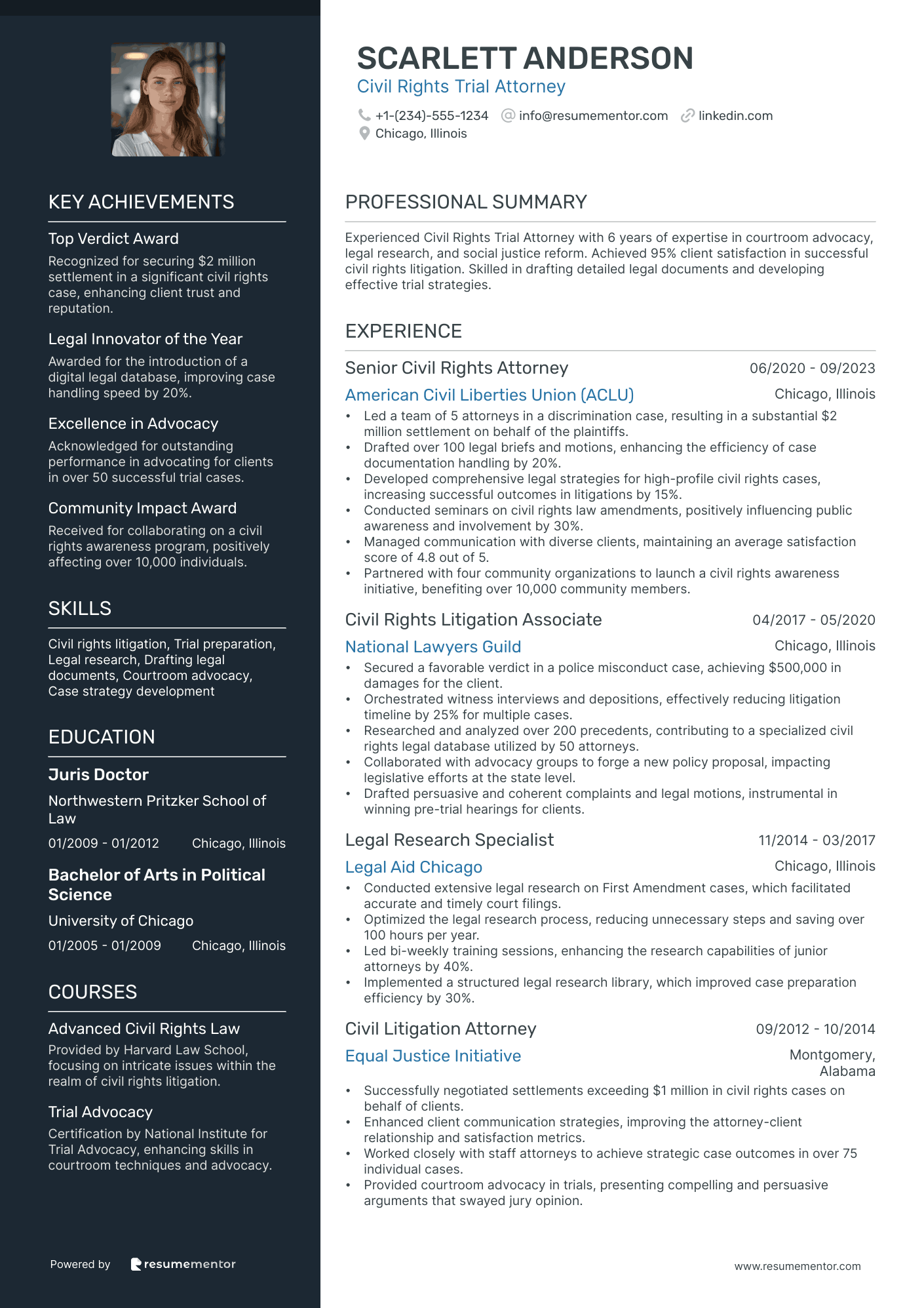
Civil Rights Trial Attorney
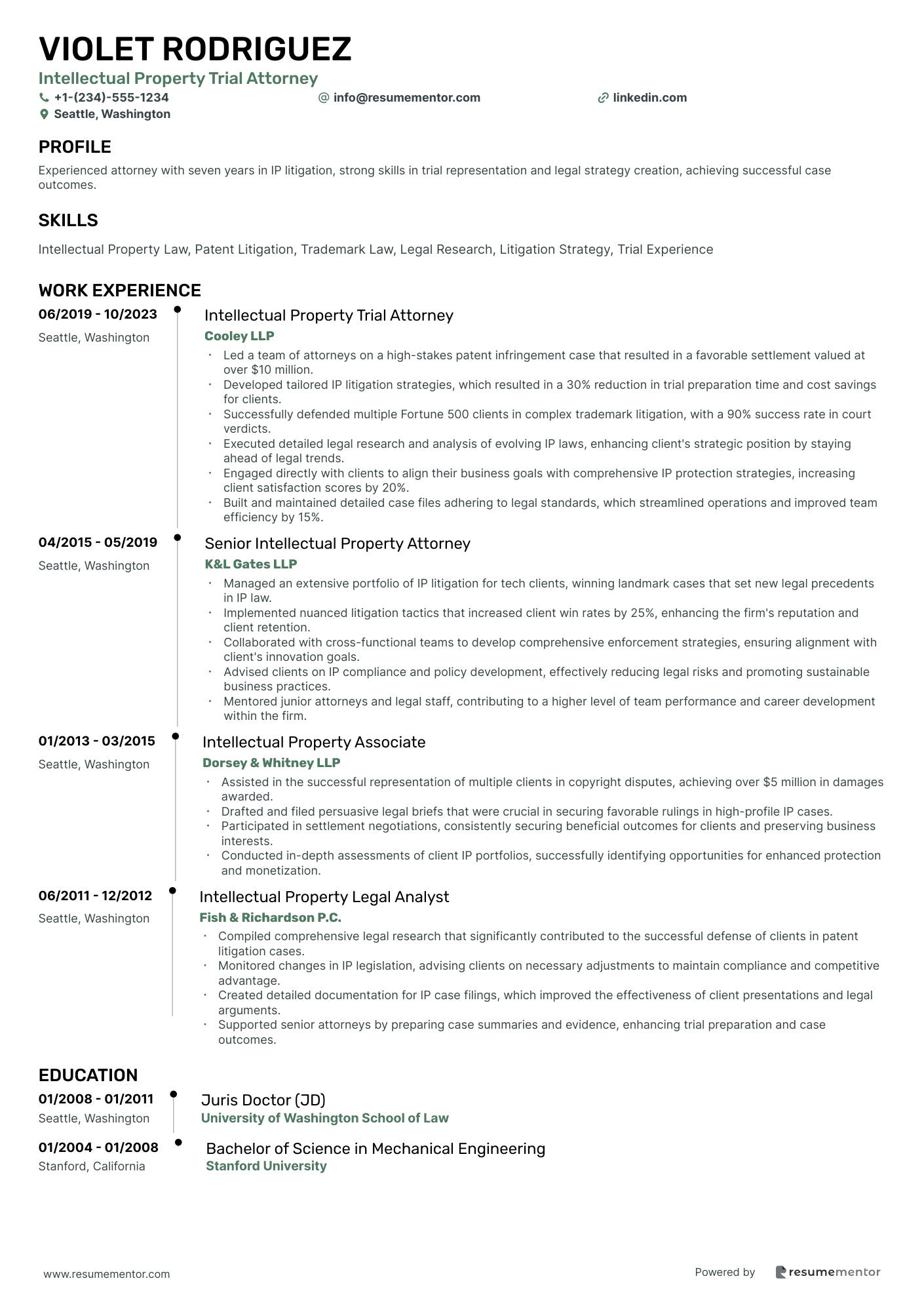
Intellectual Property Trial Attorney
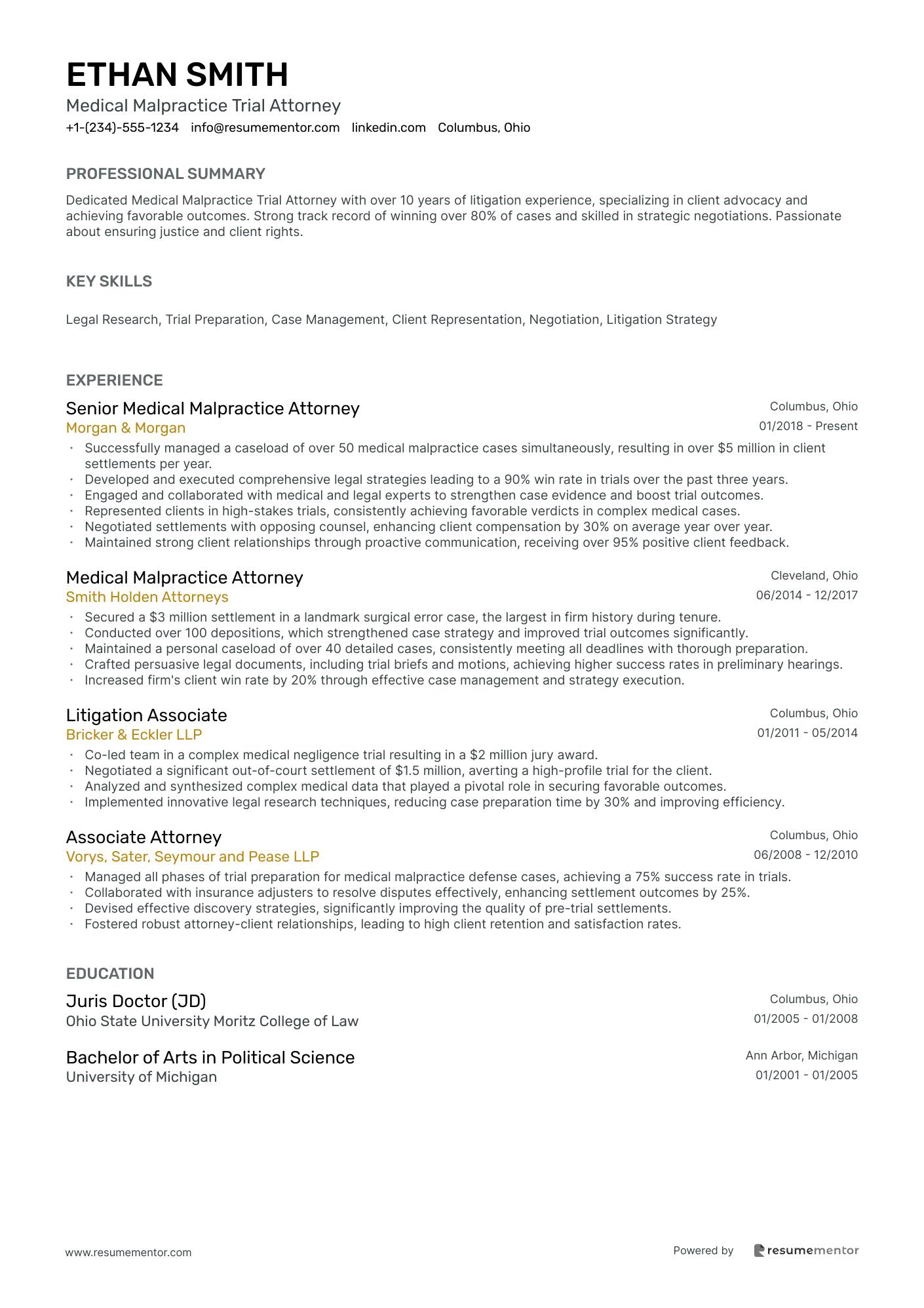
Medical Malpractice Trial Attorney
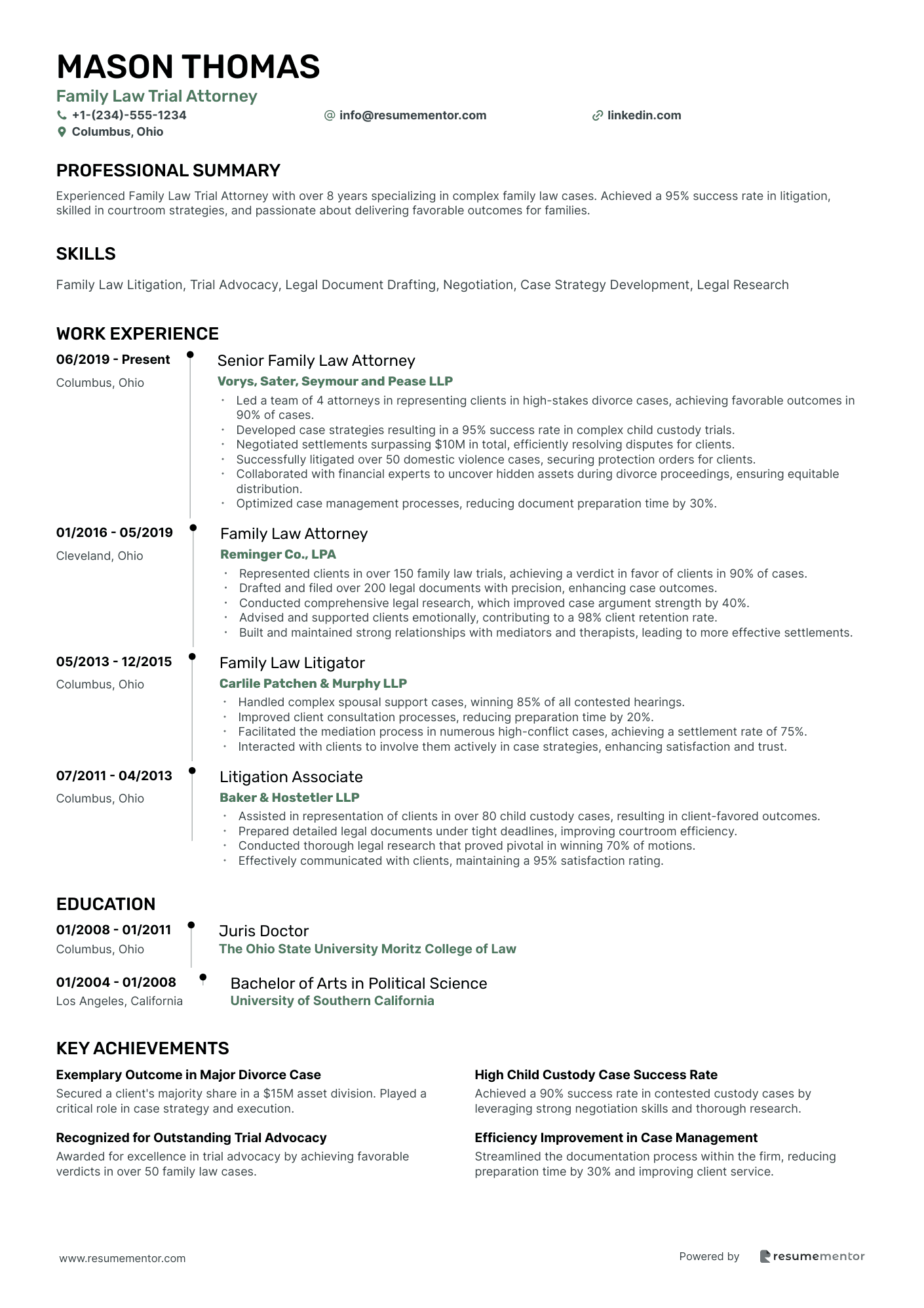
Family Law Trial Attorney
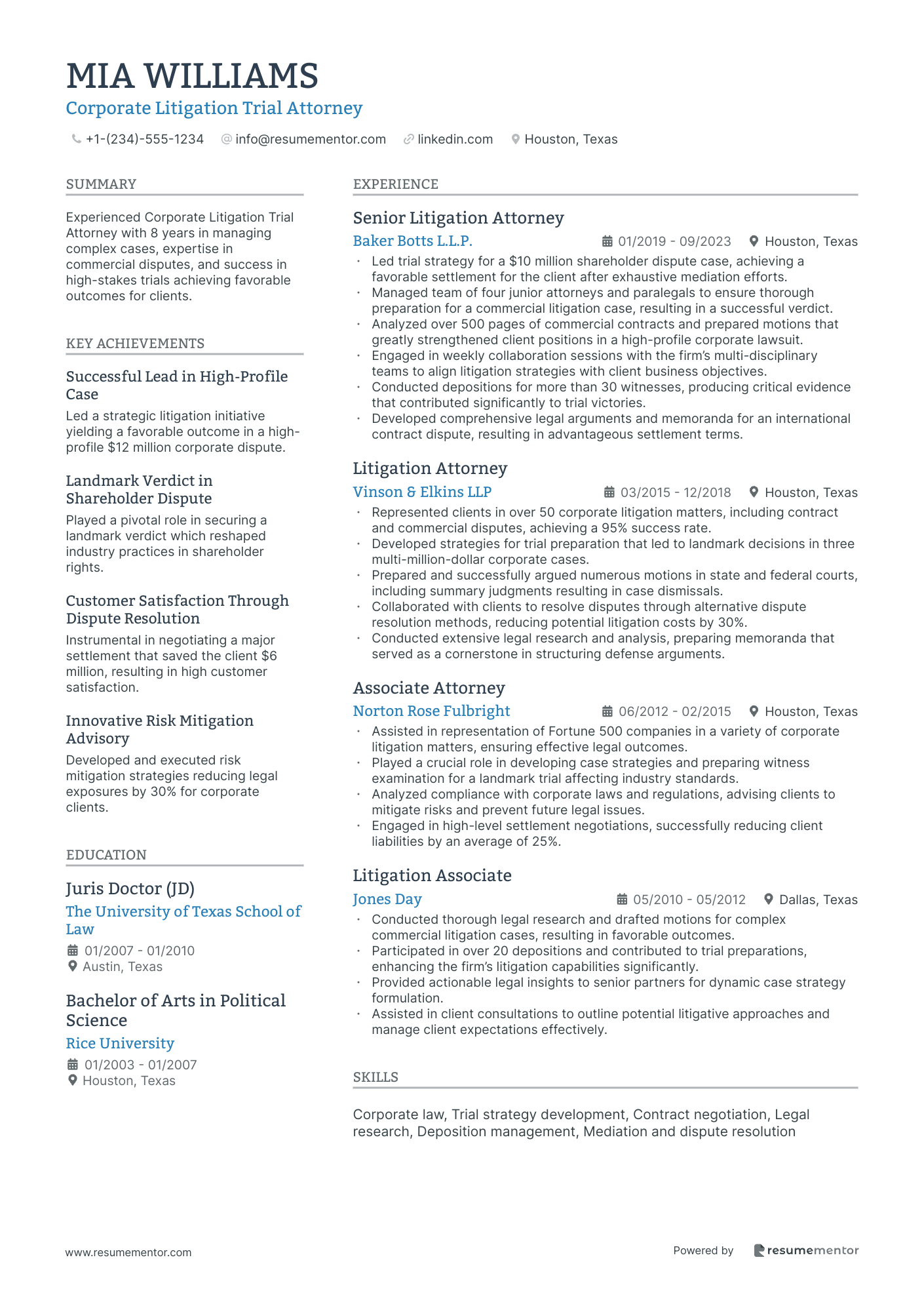
Corporate Litigation Trial Attorney
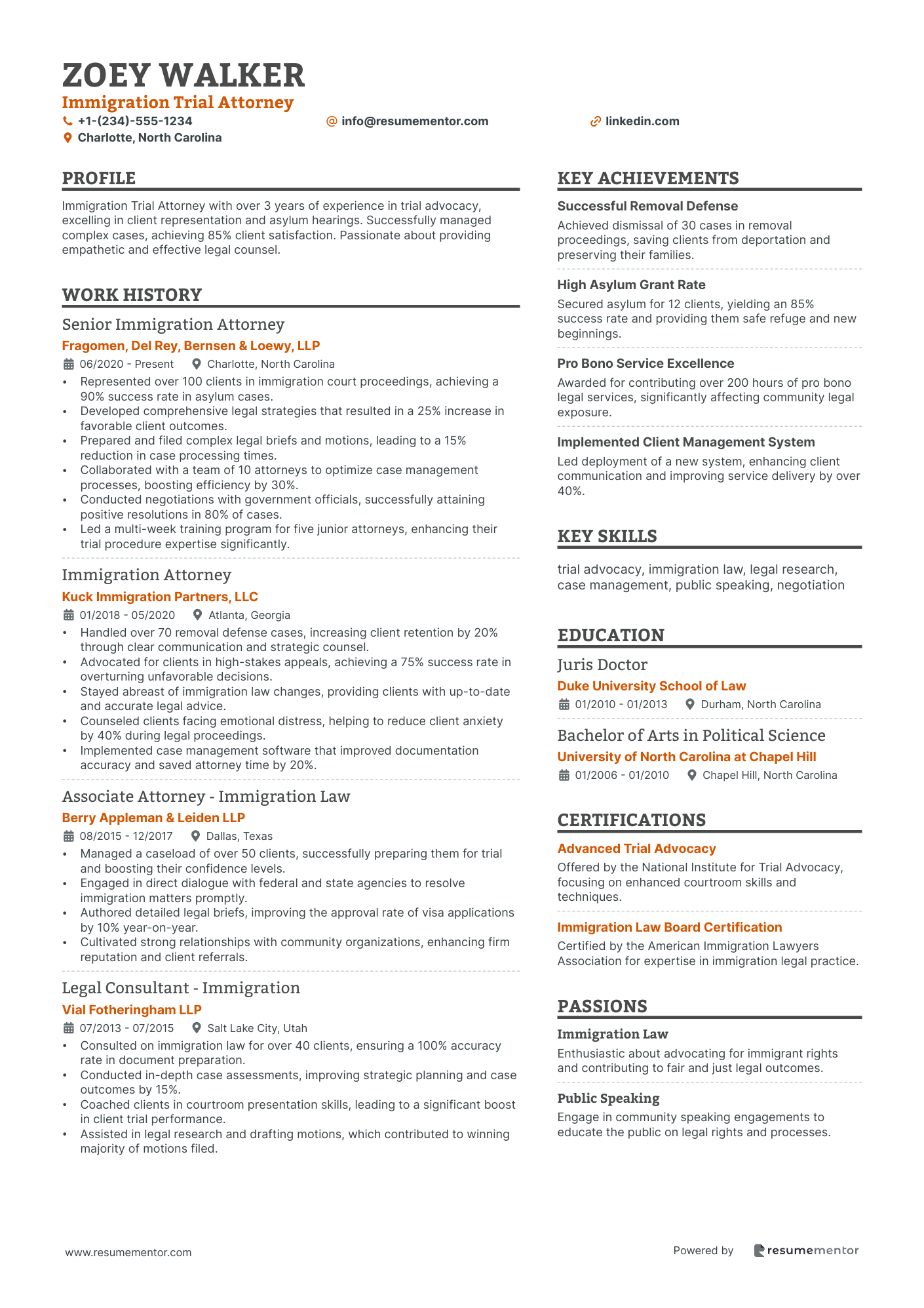
Immigration Trial Attorney
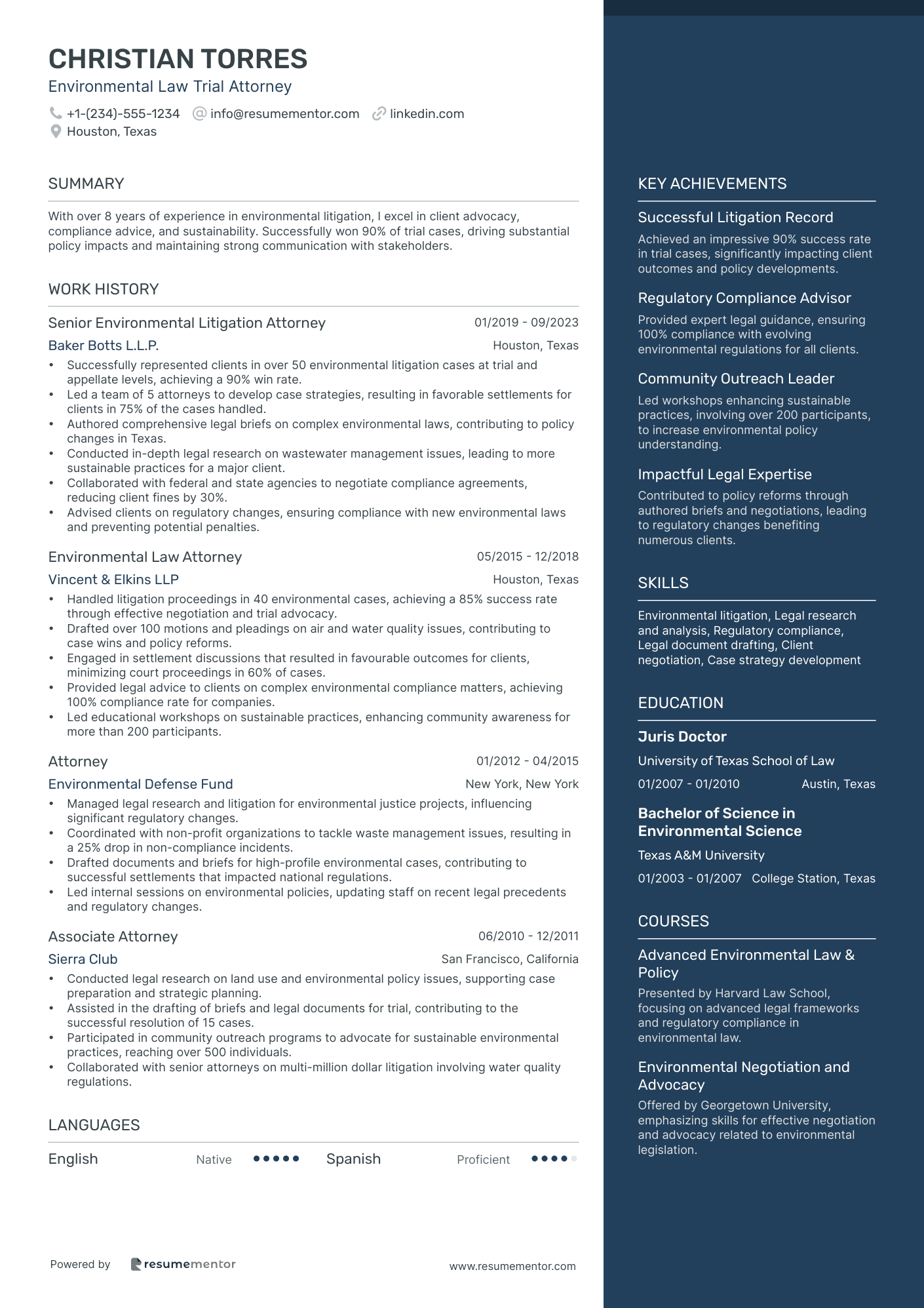
Environmental Law Trial Attorney
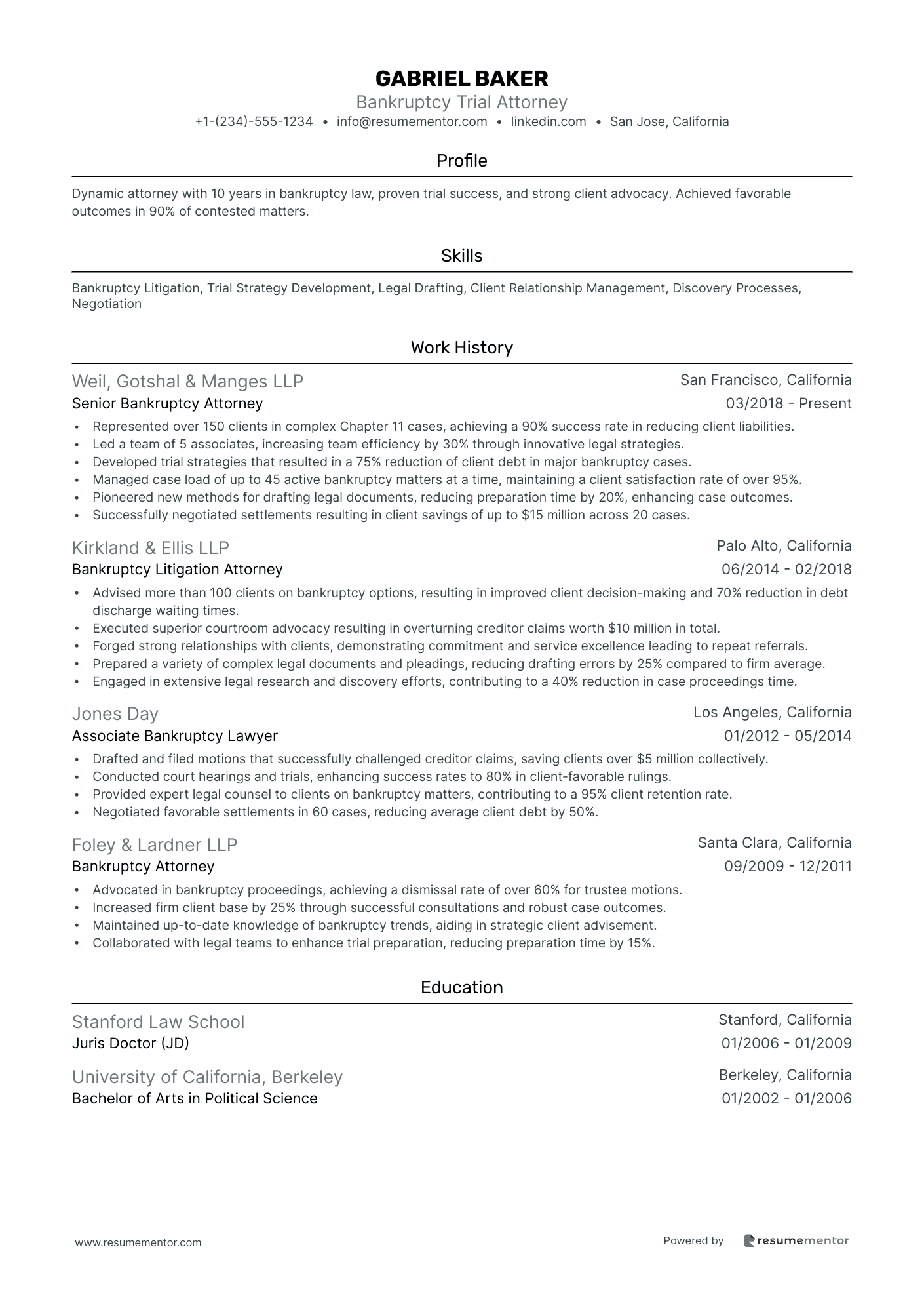
Bankruptcy Trial Attorney

Criminal Defense Trial Attorney resume sample
- •Successfully defended 60+ clients annually, achieving acquittals or lesser charges in over 75% of cases.
- •Designed and implemented innovative trial strategies leading to 35% reduction in standard client sentencing.
- •Reviewed and hired expert witnesses, improving case win ratio by 25% over a 12-month period.
- •Increased departmental efficiency by 20% by streamlining investigation processes and resource allocation.
- •Coached and led a team of junior attorneys, resulting in a 40% increase in positive client feedback scores.
- •Played a pivotal role in improving case management systems, reducing case backlog by 30% within eight months.
- •Represented over 150 clients annually in various criminal cases with a conviction reduction rate of 50%.
- •Led jury selection and trial preparation processes to ensure fair trial outcomes in 90% of cases handled.
- •Drafted over 200 legal documents including motions and appeals, resulting in faster resolution of cases.
- •Negotiated 100+ plea bargains annually, reducing client incarceration rates by 20% in negotiated cases.
- •Developed and maintained strong client relationships, achieving a client satisfaction score increase of 30%.
- •Conducted thorough investigations for over 120 criminal cases annually, leading to 40% more successful outcomes.
- •Worked collaboratively with a team of legal professionals to enhance advocacy skills and courtroom performance.
- •Assisted in crafting legal arguments for appellate court submissions with a success rate of overturning 30% of cases.
- •Initiated and facilitated community outreach programs to raise awareness of client legal rights and build trust.
- •Represented clients in 50+ trials, achieving acquittals or favorable outcomes in over 60% of cases.
- •Built strong defense strategies by integrating forensic evidence, resulting in a 20% improvement in case resolutions.
- •Successfully mitigated client penalties through comprehensive pre-trial negotiations with prosecutors.
- •Effectively led client consultations ensuring thorough understanding of legal rights and proceedings.
Personal Injury Trial Attorney resume sample
- •Successfully represented over 50 clients in personal injury trials, recovering a total of $2.5 million in compensatory damages.
- •Drafted and filed more than 200 legal documents such as pleadings, motions, and trial briefs, which streamlined case processing by 15%.
- •Provided expert legal counsel to clients, resulting in improved client satisfaction ratings and a 25% client retention increase within the last year.
- •Achieved a 90% success rate in court trials by presenting compelling arguments and negotiating favorable settlements.
- •Collaborated with expert witnesses to strengthen case presentations and maximize client awards, leading to increased win rate by 10%.
- •Mentored junior attorneys, improving team productivity by 20% over a six-month period.
- •Led litigation for diverse personal injury cases, which resulted in a 30% increase in successful settlements in two consecutive years.
- •Negotiated more than 100 settlements with insurance companies that exceeded client expectations by a combined total of $1 million.
- •Attended over 150 depositions, hearings, and mediations, thereby expediting case resolutions by approximately 25%.
- •Developed legal strategies with a focus on trial readiness, improving case outcomes and increasing the firm's client portfolio by 20%.
- •Maintained up-to-date knowledge of evolving personal injury laws, ensuring compliance and effective legal representation across all cases.
- •Assisted in preparing and presenting cases that led to a successful 80% trial win rate, boosting firm reputation.
- •Managed a high caseload effectively, resulting in a 15% reduction in case backlog over an 18-month period.
- •Completed extensive legal research and collaborated with senior attorneys to create robust trial strategies for complex cases.
- •Contributed to team efforts by mentoring junior staff, enhancing team efficiency and collaboration.
- •Handled over 30 personal injury cases, resulting in improved client outcomes and a significant settlement increase.
- •Engaged in mediation and arbitration sessions, leading to a 40% faster case resolution compared to prior years.
- •Built strong relationships with clients, increasing client referrals through consistent client satisfaction and rapport.
- •Prepared and revised legal documents, aiding in a 10% increase in document accuracy and client satisfaction.
Civil Rights Trial Attorney resume sample
- •Led a team of 5 attorneys in a discrimination case, resulting in a substantial $2 million settlement on behalf of the plaintiffs.
- •Drafted over 100 legal briefs and motions, enhancing the efficiency of case documentation handling by 20%.
- •Developed comprehensive legal strategies for high-profile civil rights cases, increasing successful outcomes in litigations by 15%.
- •Conducted seminars on civil rights law amendments, positively influencing public awareness and involvement by 30%.
- •Managed communication with diverse clients, maintaining an average satisfaction score of 4.8 out of 5.
- •Partnered with four community organizations to launch a civil rights awareness initiative, benefiting over 10,000 community members.
- •Secured a favorable verdict in a police misconduct case, achieving $500,000 in damages for the client.
- •Orchestrated witness interviews and depositions, effectively reducing litigation timeline by 25% for multiple cases.
- •Researched and analyzed over 200 precedents, contributing to a specialized civil rights legal database utilized by 50 attorneys.
- •Collaborated with advocacy groups to forge a new policy proposal, impacting legislative efforts at the state level.
- •Drafted persuasive and coherent complaints and legal motions, instrumental in winning pre-trial hearings for clients.
- •Conducted extensive legal research on First Amendment cases, which facilitated accurate and timely court filings.
- •Optimized the legal research process, reducing unnecessary steps and saving over 100 hours per year.
- •Led bi-weekly training sessions, enhancing the research capabilities of junior attorneys by 40%.
- •Implemented a structured legal research library, which improved case preparation efficiency by 30%.
- •Successfully negotiated settlements exceeding $1 million in civil rights cases on behalf of clients.
- •Enhanced client communication strategies, improving the attorney-client relationship and satisfaction metrics.
- •Worked closely with staff attorneys to achieve strategic case outcomes in over 75 individual cases.
- •Provided courtroom advocacy in trials, presenting compelling and persuasive arguments that swayed jury opinion.
Intellectual Property Trial Attorney resume sample
- •Led a team of attorneys on a high-stakes patent infringement case that resulted in a favorable settlement valued at over $10 million.
- •Developed tailored IP litigation strategies, which resulted in a 30% reduction in trial preparation time and cost savings for clients.
- •Successfully defended multiple Fortune 500 clients in complex trademark litigation, with a 90% success rate in court verdicts.
- •Executed detailed legal research and analysis of evolving IP laws, enhancing client's strategic position by staying ahead of legal trends.
- •Engaged directly with clients to align their business goals with comprehensive IP protection strategies, increasing client satisfaction scores by 20%.
- •Built and maintained detailed case files adhering to legal standards, which streamlined operations and improved team efficiency by 15%.
- •Managed an extensive portfolio of IP litigation for tech clients, winning landmark cases that set new legal precedents in IP law.
- •Implemented nuanced litigation tactics that increased client win rates by 25%, enhancing the firm's reputation and client retention.
- •Collaborated with cross-functional teams to develop comprehensive enforcement strategies, ensuring alignment with client's innovation goals.
- •Advised clients on IP compliance and policy development, effectively reducing legal risks and promoting sustainable business practices.
- •Mentored junior attorneys and legal staff, contributing to a higher level of team performance and career development within the firm.
- •Assisted in the successful representation of multiple clients in copyright disputes, achieving over $5 million in damages awarded.
- •Drafted and filed persuasive legal briefs that were crucial in securing favorable rulings in high-profile IP cases.
- •Participated in settlement negotiations, consistently securing beneficial outcomes for clients and preserving business interests.
- •Conducted in-depth assessments of client IP portfolios, successfully identifying opportunities for enhanced protection and monetization.
- •Compiled comprehensive legal research that significantly contributed to the successful defense of clients in patent litigation cases.
- •Monitored changes in IP legislation, advising clients on necessary adjustments to maintain compliance and competitive advantage.
- •Created detailed documentation for IP case filings, which improved the effectiveness of client presentations and legal arguments.
- •Supported senior attorneys by preparing case summaries and evidence, enhancing trial preparation and case outcomes.
Medical Malpractice Trial Attorney resume sample
- •Successfully managed a caseload of over 50 medical malpractice cases simultaneously, resulting in over $5 million in client settlements per year.
- •Developed and executed comprehensive legal strategies leading to a 90% win rate in trials over the past three years.
- •Engaged and collaborated with medical and legal experts to strengthen case evidence and boost trial outcomes.
- •Represented clients in high-stakes trials, consistently achieving favorable verdicts in complex medical cases.
- •Negotiated settlements with opposing counsel, enhancing client compensation by 30% on average year over year.
- •Maintained strong client relationships through proactive communication, receiving over 95% positive client feedback.
- •Secured a $3 million settlement in a landmark surgical error case, the largest in firm history during tenure.
- •Conducted over 100 depositions, which strengthened case strategy and improved trial outcomes significantly.
- •Maintained a personal caseload of over 40 detailed cases, consistently meeting all deadlines with thorough preparation.
- •Crafted persuasive legal documents, including trial briefs and motions, achieving higher success rates in preliminary hearings.
- •Increased firm's client win rate by 20% through effective case management and strategy execution.
- •Co-led team in a complex medical negligence trial resulting in a $2 million jury award.
- •Negotiated a significant out-of-court settlement of $1.5 million, averting a high-profile trial for the client.
- •Analyzed and synthesized complex medical data that played a pivotal role in securing favorable outcomes.
- •Implemented innovative legal research techniques, reducing case preparation time by 30% and improving efficiency.
- •Managed all phases of trial preparation for medical malpractice defense cases, achieving a 75% success rate in trials.
- •Collaborated with insurance adjusters to resolve disputes effectively, enhancing settlement outcomes by 25%.
- •Devised effective discovery strategies, significantly improving the quality of pre-trial settlements.
- •Fostered robust attorney-client relationships, leading to high client retention and satisfaction rates.
Family Law Trial Attorney resume sample
- •Led a team of 4 attorneys in representing clients in high-stakes divorce cases, achieving favorable outcomes in 90% of cases.
- •Developed case strategies resulting in a 95% success rate in complex child custody trials.
- •Negotiated settlements surpassing $10M in total, efficiently resolving disputes for clients.
- •Successfully litigated over 50 domestic violence cases, securing protection orders for clients.
- •Collaborated with financial experts to uncover hidden assets during divorce proceedings, ensuring equitable distribution.
- •Optimized case management processes, reducing document preparation time by 30%.
- •Represented clients in over 150 family law trials, achieving a verdict in favor of clients in 90% of cases.
- •Drafted and filed over 200 legal documents with precision, enhancing case outcomes.
- •Conducted comprehensive legal research, which improved case argument strength by 40%.
- •Advised and supported clients emotionally, contributing to a 98% client retention rate.
- •Built and maintained strong relationships with mediators and therapists, leading to more effective settlements.
- •Handled complex spousal support cases, winning 85% of all contested hearings.
- •Improved client consultation processes, reducing preparation time by 20%.
- •Facilitated the mediation process in numerous high-conflict cases, achieving a settlement rate of 75%.
- •Interacted with clients to involve them actively in case strategies, enhancing satisfaction and trust.
- •Assisted in representation of clients in over 80 child custody cases, resulting in client-favored outcomes.
- •Prepared detailed legal documents under tight deadlines, improving courtroom efficiency.
- •Conducted thorough legal research that proved pivotal in winning 70% of motions.
- •Effectively communicated with clients, maintaining a 95% satisfaction rating.
Corporate Litigation Trial Attorney resume sample
- •Led trial strategy for a $10 million shareholder dispute case, achieving a favorable settlement for the client after exhaustive mediation efforts.
- •Managed team of four junior attorneys and paralegals to ensure thorough preparation for a commercial litigation case, resulting in a successful verdict.
- •Analyzed over 500 pages of commercial contracts and prepared motions that greatly strengthened client positions in a high-profile corporate lawsuit.
- •Engaged in weekly collaboration sessions with the firm’s multi-disciplinary teams to align litigation strategies with client business objectives.
- •Conducted depositions for more than 30 witnesses, producing critical evidence that contributed significantly to trial victories.
- •Developed comprehensive legal arguments and memoranda for an international contract dispute, resulting in advantageous settlement terms.
- •Represented clients in over 50 corporate litigation matters, including contract and commercial disputes, achieving a 95% success rate.
- •Developed strategies for trial preparation that led to landmark decisions in three multi-million-dollar corporate cases.
- •Prepared and successfully argued numerous motions in state and federal courts, including summary judgments resulting in case dismissals.
- •Collaborated with clients to resolve disputes through alternative dispute resolution methods, reducing potential litigation costs by 30%.
- •Conducted extensive legal research and analysis, preparing memoranda that served as a cornerstone in structuring defense arguments.
- •Assisted in representation of Fortune 500 companies in a variety of corporate litigation matters, ensuring effective legal outcomes.
- •Played a crucial role in developing case strategies and preparing witness examination for a landmark trial affecting industry standards.
- •Analyzed compliance with corporate laws and regulations, advising clients to mitigate risks and prevent future legal issues.
- •Engaged in high-level settlement negotiations, successfully reducing client liabilities by an average of 25%.
- •Conducted thorough legal research and drafted motions for complex commercial litigation cases, resulting in favorable outcomes.
- •Participated in over 20 depositions and contributed to trial preparations, enhancing the firm’s litigation capabilities significantly.
- •Provided actionable legal insights to senior partners for dynamic case strategy formulation.
- •Assisted in client consultations to outline potential litigative approaches and manage client expectations effectively.
Immigration Trial Attorney resume sample
- •Represented over 100 clients in immigration court proceedings, achieving a 90% success rate in asylum cases.
- •Developed comprehensive legal strategies that resulted in a 25% increase in favorable client outcomes.
- •Prepared and filed complex legal briefs and motions, leading to a 15% reduction in case processing times.
- •Collaborated with a team of 10 attorneys to optimize case management processes, boosting efficiency by 30%.
- •Conducted negotiations with government officials, successfully attaining positive resolutions in 80% of cases.
- •Led a multi-week training program for five junior attorneys, enhancing their trial procedure expertise significantly.
- •Handled over 70 removal defense cases, increasing client retention by 20% through clear communication and strategic counsel.
- •Advocated for clients in high-stakes appeals, achieving a 75% success rate in overturning unfavorable decisions.
- •Stayed abreast of immigration law changes, providing clients with up-to-date and accurate legal advice.
- •Counseled clients facing emotional distress, helping to reduce client anxiety by 40% during legal proceedings.
- •Implemented case management software that improved documentation accuracy and saved attorney time by 20%.
- •Managed a caseload of over 50 clients, successfully preparing them for trial and boosting their confidence levels.
- •Engaged in direct dialogue with federal and state agencies to resolve immigration matters promptly.
- •Authored detailed legal briefs, improving the approval rate of visa applications by 10% year-on-year.
- •Cultivated strong relationships with community organizations, enhancing firm reputation and client referrals.
- •Consulted on immigration law for over 40 clients, ensuring a 100% accuracy rate in document preparation.
- •Conducted in-depth case assessments, improving strategic planning and case outcomes by 15%.
- •Coached clients in courtroom presentation skills, leading to a significant boost in client trial performance.
- •Assisted in legal research and drafting motions, which contributed to winning majority of motions filed.
Environmental Law Trial Attorney resume sample
- •Successfully represented clients in over 50 environmental litigation cases at trial and appellate levels, achieving a 90% win rate.
- •Led a team of 5 attorneys to develop case strategies, resulting in favorable settlements for clients in 75% of the cases handled.
- •Authored comprehensive legal briefs on complex environmental laws, contributing to policy changes in Texas.
- •Conducted in-depth legal research on wastewater management issues, leading to more sustainable practices for a major client.
- •Collaborated with federal and state agencies to negotiate compliance agreements, reducing client fines by 30%.
- •Advised clients on regulatory changes, ensuring compliance with new environmental laws and preventing potential penalties.
- •Handled litigation proceedings in 40 environmental cases, achieving a 85% success rate through effective negotiation and trial advocacy.
- •Drafted over 100 motions and pleadings on air and water quality issues, contributing to case wins and policy reforms.
- •Engaged in settlement discussions that resulted in favourable outcomes for clients, minimizing court proceedings in 60% of cases.
- •Provided legal advice to clients on complex environmental compliance matters, achieving 100% compliance rate for companies.
- •Led educational workshops on sustainable practices, enhancing community awareness for more than 200 participants.
- •Managed legal research and litigation for environmental justice projects, influencing significant regulatory changes.
- •Coordinated with non-profit organizations to tackle waste management issues, resulting in a 25% drop in non-compliance incidents.
- •Drafted documents and briefs for high-profile environmental cases, contributing to successful settlements that impacted national regulations.
- •Led internal sessions on environmental policies, updating staff on recent legal precedents and regulatory changes.
- •Conducted legal research on land use and environmental policy issues, supporting case preparation and strategic planning.
- •Assisted in the drafting of briefs and legal documents for trial, contributing to the successful resolution of 15 cases.
- •Participated in community outreach programs to advocate for sustainable environmental practices, reaching over 500 individuals.
- •Collaborated with senior attorneys on multi-million dollar litigation involving water quality regulations.
Bankruptcy Trial Attorney resume sample
- •Represented over 150 clients in complex Chapter 11 cases, achieving a 90% success rate in reducing client liabilities.
- •Led a team of 5 associates, increasing team efficiency by 30% through innovative legal strategies.
- •Developed trial strategies that resulted in a 75% reduction of client debt in major bankruptcy cases.
- •Managed case load of up to 45 active bankruptcy matters at a time, maintaining a client satisfaction rate of over 95%.
- •Pioneered new methods for drafting legal documents, reducing preparation time by 20%, enhancing case outcomes.
- •Successfully negotiated settlements resulting in client savings of up to $15 million across 20 cases.
- •Advised more than 100 clients on bankruptcy options, resulting in improved client decision-making and 70% reduction in debt discharge waiting times.
- •Executed superior courtroom advocacy resulting in overturning creditor claims worth $10 million in total.
- •Forged strong relationships with clients, demonstrating commitment and service excellence leading to repeat referrals.
- •Prepared a variety of complex legal documents and pleadings, reducing drafting errors by 25% compared to firm average.
- •Engaged in extensive legal research and discovery efforts, contributing to a 40% reduction in case proceedings time.
- •Drafted and filed motions that successfully challenged creditor claims, saving clients over $5 million collectively.
- •Conducted court hearings and trials, enhancing success rates to 80% in client-favorable rulings.
- •Provided expert legal counsel to clients on bankruptcy matters, contributing to a 95% client retention rate.
- •Negotiated favorable settlements in 60 cases, reducing average client debt by 50%.
- •Advocated in bankruptcy proceedings, achieving a dismissal rate of over 60% for trustee motions.
- •Increased firm client base by 25% through successful consultations and robust case outcomes.
- •Maintained up-to-date knowledge of bankruptcy trends, aiding in strategic client advisement.
- •Collaborated with legal teams to enhance trial preparation, reducing preparation time by 15%.
Crafting a compelling trial attorney resume is like building a strong case. You excel at making arguments in court, but translating that experience onto paper poses its own challenges. Capturing your courtroom wins and articulating your legal skills can feel overwhelming, especially when trying to do it concisely.
Your resume serves as the first impression for potential employers, making it essential to convey your courtroom prowess and legal acumen quickly. Highlighting the perfect blend of litigation experience, negotiation skills, and legal knowledge is the key to standing out in a competitive field. But how do you ensure your legal expertise catches the eye?
Using a resume template can help you organize your achievements and qualifications systematically, leaving nothing important behind. These resume templates offer a structured approach, making it easier to showcase your ability to build trust, win cases, and handle pressure effectively.
With a well-structured resume, you can grab attention and provide a cohesive narrative of your skills and accomplishments. It should vividly yet concisely tell the story of your career. This guide will help you transform your legal experience into a standout resume, paving the way to exciting opportunities.
Key Takeaways
- Crafting a compelling trial attorney resume involves selecting the right format, such as the chronological format, which effectively showcases courtroom experience and achievements.
- Using modern fonts and saving the resume as a PDF preserve the document's professional appearance across various devices, ensuring consistency.
- A strong experience section should quantify achievements with metrics and illustrate your impact using strong action verbs.
- Highlighting both hard skills like litigation strategy and soft skills like communication enhances the resume's appeal to potential employers.
- Addition of relevant certifications and extra sections like language proficiency or volunteer work further distinguishes your qualifications.
What to focus on when writing your trial attorney resume
A trial attorney resume should effectively convey your litigation skills, courtroom experience, and ability to manage cases with success. It’s essential to highlight your legal expertise and team collaboration skills, demonstrating how you can deliver favorable verdicts and settlements, thus making you a valuable asset.
How to structure your trial attorney resume
- Contact Information: Ensure your full name, phone number, email address, and LinkedIn profile are easy to find—this information should be prominently displayed at the top of the resume, allowing recruiters to contact you without difficulty. The clarity and accuracy of this section set the stage for your professional presence.
- Professional Summary: Start with a concise yet impactful overview of your courtroom accomplishments and legal skills. Emphasize your years of experience and specialized areas of practice—this brief section serves as a hook to draw in the recruiter’s interest by showcasing your unique value proposition as a trial attorney.
- Work Experience: Clearly outline your previous litigation roles, detailing your responsibilities and achievements. Underscore your effectiveness with concrete statistics such as the number of cases you have won and your success rates in negotiations—this comprehensive account provides insight into your practical impact in the field.
- Education: Your educational background forms the bedrock of your qualifications. Include your law degree, highlighting your law school, the degree earned, and your graduation date—this foundational information cements your credentials and supports your expertise as a trial attorney.
- Skills: A well-rounded skill set strengthens your appeal. Focus on critical skills like legal research, negotiation, public speaking, and analytical thinking—this section allows you to showcase the competencies that align with the demands of the role.
- Licenses and Certifications: List your state bar admissions along with other pertinent legal certifications—these qualifications confirm your readiness and ability to practice law effectively. As we delve into each section more in-depth, the right resume format ties everything together for maximum impact.
Which resume format to choose
As a trial attorney, crafting a compelling resume begins with selecting the right format. The chronological format is particularly suited to your profession, as it effectively organizes your extensive courtroom experience and notable cases. This style not only highlights your career progression but also aligns with what legal employers expect, providing a clear timeline of your achievements.
Choosing the right font plays a crucial role in enhancing the resume's overall impression. Modern fonts such as Lato, Montserrat, or Raleway offer a fresh and clean appearance that underscores professionalism. These fonts ensure that your document remains readable and visually appealing, helping your credentials stand out without distracting the reader with outdated styles like Arial or Times New Roman.
When you're ready to share your resume, save it as a PDF. This file type is essential for maintaining your carefully chosen format across different devices and systems, ensuring your document appears polished and professional. This consistency is crucial in maintaining the integrity of your presentation, as any formatting errors could detract from your accomplishments.
Maintain one-inch margins around your resume to create a clean and polished look. This spacing not only ensures that no information is cut off during printing but also provides ample white space, which enhances readability. Your resume should present information clearly and concisely, allowing potential employers to focus on your qualifications and achievements.
By integrating a strategic format, modern fonts, and a consistent file type, you craft a trial attorney resume that effectively communicates your experience and professionalism. This thoughtful approach helps ensure that you make a strong impression on potential employers, showcasing your capability and readiness for new challenges.
How to write a quantifiable resume experience section
A compelling trial attorney resume experience section should highlight your courtroom successes and practical achievements. This section is essential because it outlines your career timeline, showcases your expertise, and underscores your impact in previous roles. Start with your most recent positions, as this helps communicate your current skill set. Focus on jobs from the last 10-15 years that are directly related to trial law to ensure relevance. Tailor your experience to the job description, so every bullet point reflects the key skills and responsibilities the employer is seeking. Using strong action verbs like "litigated," "orchestrated," or "achieved" adds clarity and confidence to your successes.
This tailoring process shows hiring managers exactly why you are the right fit for their needs by spotlighting your direct contributions in past roles. Here's an example of an experience section that achieves this:
- •Achieved a 95% win rate in over 120 high-stakes litigation trials.
- •Orchestrated strategies for cases involving $50M+ in potential settlements, securing favorable outcomes for clients.
- •Mentored a team of 10 junior attorneys, improving team efficiency by 30% and fostering professional growth.
- •Developed innovative legal arguments that were cited in multiple legal publications and forums.
This example highlights your career with vivid achievements, clearly demonstrating your strengths as a seasoned trial attorney. The high win rate and handling of substantial settlements illustrate your ability to deliver results that matter. By showcasing quantifiable achievements, you provide a clear picture of the value you bring. The inclusion of mentoring shows your leadership, while innovative legal arguments stress your expertise and thought leadership within the industry. This comprehensive approach ensures your resume is not just a list of duties but a dynamic presentation of your professional impact.
Collaboration-Focused resume experience section
A Collaboration-Focused Trial Attorney resume experience section should spotlight your ability to work effectively as part of a team. Highlight your contributions to achieving successful case outcomes by showcasing instances where collaboration made a difference. Identify key moments where your teamwork skills were essential, and illustrate how you played a pivotal role in these situations. Mention any leadership roles you took on, teamwork with co-counsel, or involvement in cross-department projects to paint a comprehensive picture of your collaborative efforts.
Organize your achievements using concise bullet points that reflect your role in the team, specifying tasks, responsibilities, and outcomes. For instance, detail how coordinating with forensic experts bolstered your case arguments or how working alongside senior partners resulted in successful strategies. Using action verbs can make the description more engaging, and including measurable results will effectively demonstrate your impact on the team's success.
Trial Attorney
Renowned Law Firm
June 2017 - Present
- Led a team of junior attorneys and paralegals to prepare for a high-profile civil trial, resulting in a favorable verdict.
- Coordinated with forensic experts and external consultants to strengthen case arguments, enhancing overall case strategy.
- Facilitated cross-department meetings to ensure consistent communication and strategy alignment, increasing team efficiency by 15%.
- Collaborated with senior partners to refine legal strategies, leading to successful settlements in 90% of cases handled.
Industry-Specific Focus resume experience section
A trial attorney-focused resume experience section should vividly showcase your courtroom successes, case-handling prowess, and legal insights. Start by highlighting specific cases that illustrate your strategic thinking and ability to secure positive outcomes. Describe your achievements in a manner that captivates, offering potential employers insight into your adeptness at managing complex legal scenarios. Emphasize your role in notable cases or breakthroughs and detail how you navigated legal challenges. Use clear and straightforward language to craft an engaging narrative of your courtroom presence and legal expertise.
For each entry, include your job title, company, and relevant dates to provide context. Use bullet points to highlight your most significant achievements and focus on tangible results rather than just listing duties. Mention any awards, recognitions, or milestones that underscore your career accomplishments. This method helps prospective employers see the distinct value you've contributed in your previous roles and anticipate similar contributions to their team.
Trial Attorney
Smith & Associates Law Firm
June 2015 - Present
- Led a team in a multi-million dollar securities fraud case, achieving a favorable settlement.
- Successfully argued motions in high-stakes federal court cases, enhancing firm's reputation.
- Collaborated with experts to present forensic evidence, securing client victories.
- Mentored junior attorneys in trial preparation, improving overall team performance.
Result-Focused resume experience section
A result-focused trial attorney resume experience section should showcase your achievements and highlight the impact of your work rather than listing routine tasks. Start by stating your job title and the organization you worked for, along with the duration of your employment. This sets the stage for the accomplishments you'll describe next. Use bullet points to emphasize specific achievements, such as winning cases, securing favorable settlements, or enhancing legal strategies. When possible, quantify these achievements with metrics like the number of cases won or the percentage increase in client satisfaction, which vividly illustrates your effectiveness and contributions.
Connect each bullet point to the overall value you provided to your previous employer. If you were part of a team success story, explain your role and how it contributed to achieving the goals or overcoming challenges. Strong action verbs add impact to your experience, while focusing on results underscores your capability and expertise. By including relevant skills that align with the role you're applying for, you can tailor your content to appeal to potential employers.
Senior Trial Attorney
Smith & Associates Law Firm
2018-Present
- Led a team to win over 85% of cases handled, boosting firm reputation.
- Secured settlements exceeding $10 million for clients in complex litigation cases.
- Developed and implemented legal strategies that improved case resolution times by 35%.
- Trained and mentored junior attorneys, resulting in a 50% increase in team productivity.
Responsibility-Focused resume experience section
A responsibility-focused trial attorney resume experience section should seamlessly highlight your specific contributions and achievements in past roles. Start by identifying the core responsibilities where you excelled, such as implementing legal strategies, managing cases, and effectively communicating with clients and courtroom personnel. This approach allows you to showcase leadership skills, such as guiding legal research and influencing case outcomes. Each statement should clearly connect your actions to successful results, emphasizing your direct impact on case progress and resolution.
When writing, use concise language to quickly convey your ability to tackle legal challenges. Bullet points effectively outline key contributions while maintaining a cohesive narrative flow. Focus on quantifiable achievements, and whenever possible, provide context to demonstrate your effectiveness and potential for future roles. By doing so, you illustrate your capability in managing complex legal tasks and fostering successful results. Here is an example structure to guide you:
Trial Attorney
Smith & Associates Law Firm
June 2018 - August 2023
- Led multiple high-stakes litigation cases, achieving a 90% win rate.
- Managed a team of junior attorneys and paralegals, fostering a collaborative and efficient work environment.
- Developed comprehensive legal strategies, resulting in favorable settlements in over 30 cases.
- Negotiated settlement agreements that saved clients an average of $500,000 per case.
Write your trial attorney resume summary section
A trial attorney-focused resume summary should concisely highlight your key skills and achievements, focusing on what makes you stand out in your legal role. With experience, your summary can showcase courtroom successes and legal expertise. Consider this example:
This example demonstrates specialization, experience, and notable achievements. Strong action words like "dynamic" and "skilled" effectively convey your confidence and competence. It’s important to note the difference between a resume summary and an objective: a summary highlights accomplishments, while an objective focuses on career goals. Similarly, resume profiles are akin to summaries but tell a broader career story. Meanwhile, a summary of qualifications provides a list of key skills or awards. A well-crafted summary quickly showcases the value you bring, allowing your expertise to shine through quantifiable achievements. By highlighting these, hiring managers can understand your worth at a glance, instantly seeing how you stand out. Tangible achievements grab attention and ensure your resume makes a strong first impression. Conciseness and relevance to the role allow employers to quickly assess your unique qualities and professional strengths.
Listing your trial attorney skills on your resume
A skills-focused trial attorney resume should have a well-structured section that highlights your capabilities and expertise. You can either create a separate skills section or blend these skills into your experience and summary areas. Begin with your strengths, showcasing essential soft skills like communication and leadership, which are crucial in legal settings. Hard skills, such as litigation tactics and legal research, reflect specific abilities gained through education and practice.
Your skills and strengths act as vital resume keywords, drawing the attention of hiring managers and applicant tracking systems. To make your resume more effective, include skills directly relevant to the job. Here’s how a skills section might be structured for a trial attorney:
Listing skills like trial preparation and legal research shows you’re ready for courtroom challenges, while cross-examination and case analysis skills highlight your tactical expertise. This balanced mix of skills reflects your ability to handle trials effectively and efficiently.
Best hard skills to feature on your trial attorney resume
Your resume should emphasize hard skills that highlight your technical expertise and legal procedure proficiency. These skills demonstrate your capability to manage the complexities of trial law.
Hard Skills
- Trial Preparation
- Legal Research
- Litigation Strategy
- Cross-Examination
- Case Analysis
- Brief Writing
- Evidence Collection
- Client Consultation
- Negotiation
- Legal Writing
- Courtroom Procedure
- Risk Assessment
- Deposition Management
- Jury Selection
- Technology Use in Courtrooms
Best soft skills to feature on your trial attorney resume
Incorporating soft skills on your resume showcases your interpersonal aptitude and adaptability in high-stress environments. They play a crucial role in persuading clients and building strong cases.
Soft Skills
- Communication
- Leadership
- Teamwork
- Problem-Solving
- Persuasion
- Emotional Intelligence
- Conflict Resolution
- Time Management
- Adaptability
- Decision-Making
- Critical Thinking
- Attention to Detail
- Patience
- Stress Management
- Empathy
How to include your education on your resume
The education section is a crucial part of any trial attorney's resume. It offers a snapshot of your academic background, which is often foundational to your professional success. Tailoring this section to the job you're applying for is essential; avoid listing education that doesn't relate directly to law or your role as a trial attorney. If your GPA was impressive (typically 3.5 or higher), include it to underscore your academic aptitude. Also, if you graduated with honors, like cum laude, it's important to note this accomplishment. When listing your degree, be precise and include the type of degree, your major, and the institution. Here is what a wrong and right education section might look like:
- •Graduated cum laude
The second example is effective as it highlights a Juris Doctor degree from a prestigious institution, relevant to a trial attorney role. Listing a GPA of 3.8 and cum laude honors emphasizes academic excellence. The emphasis on law-specific education along with honors makes this a compelling entry on a resume, appealing directly to legal employers.
How to include trial attorney certificates on your resume
Including a certificates section in your trial attorney resume is crucial. Certificates showcase additional qualifications and specialized training, setting you apart. To include certificates, list the name of the certificate, include the date you received it, and add the issuing organization. Optionally, you can place certificates in the header for quick visibility.
Consider the following example JSON structure for a clean and organized display of your certificates:
This example is strong because it displays certificates relevant to a trial attorney. Including both civil and criminal trial attorney certifications shows varied expertise. Also, listing reputable issuing organizations, like the National Board of Trial Advocacy, adds credibility to your qualifications. The format ensures clarity and easy reading, which enhances the professionalism of your resume.
Extra sections to include in your trial attorney resume
As a trial attorney, presenting a polished and comprehensive resume is essential to stand out in the competitive legal field. Beyond showcasing your educational background and professional experience, including additional sections can highlight your diverse skills and interests.
- Language section — Highlight your proficiency in multiple languages. Show that you can serve a broader client base and navigate various legal systems.
- Hobbies and interests section — Include personal interests to portray a well-rounded character. Demonstrate your ability to balance professional and personal life.
- Volunteer work section — Detail your volunteer activities to illustrate your commitment to community service. Highlight pro bono work to show ethical dedication.
- Books section — Mention legal or relevant books you have read. Show your continuous learning and passion for your field.
In Conclusion
In conclusion, crafting a strong trial attorney resume is much like presenting a well-prepared case. Each element of your resume should reflect your legal skills and accomplishments in a way that is both clear and compelling. Remember, your resume is often your first introduction to potential employers, so it must show your courtroom expertise and unique value effectively.
Use a strategic format to highlight your achievements, making sure to choose a modern and professional font that enhances readability. By structuring your experience section with quantifiable successes and demonstrating your collaboration skills, you present a holistic picture of your abilities to manage and win cases. Don't forget to list the skills that you excel in, which can act as resume keywords, ensuring your resume passes through application systems and reaches hiring managers.
Your education and any additional certifications are also vital, as they underscore your qualifications and preparedness for the role. Highlighting your academic honors and specific trial-related certificates can set you apart in the pool of candidates. Consider adding sections that showcase your language skills, volunteer work, or personal interests to portray a well-rounded professional image.
Incorporating these elements into your resume will help ensure it makes a lasting impression. By clearly communicating your abilities and achievements, you stand ready for new challenges and opportunities in your legal career.
Related Articles

Continue Reading
Check more recommended readings to get the job of your dreams.
Resume
Resources
Tools
© 2026. All rights reserved.
Made with love by people who care.

